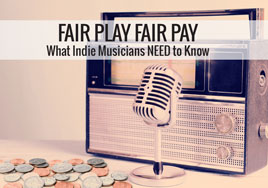
What Independent Musicians Need to Know About Fair Play Fair Pay
ByEstimated reading time: 6 minutes
Take a minute and journey with me into the muddy waters of licensing, royalty payment, and copyright. If you’ve had much experience with these things in the past, you quickly realize that the way that copyright holders in the United States get paid is a complicated mess.
Unfortunately, this mess is one of the most important things for artists and musicians to understand. If you missed our series on understanding copyright, I recommend you take a few minutes and read them.
These articles will help give you a good foundation to understand the rest of this article, and why Fair Play Fair Pay is important.
What is Fair Play Fair Pay?
One of the odd quirks of copyright law is that the performing artist does not get paid when their song is played on traditional radio. When a song is played on your favorite FM radio station, the station pays only the owner of the underlying musical work. This usually means that the publishing company gets paid, and then they pay the writers of the song. This is different from digital radio services like Pandora, Sirius XM, and Spotify, which are required to pay royalties to the artist and owner of the sound recording copyright, in addition to the owner of the underlying musical work.
Currently, the United States is one of the only developed countries in the world that doesn’t also pay artists and sound recording owners when their music is played on traditional radio. But the Fair Play Fair Pay Act is trying to change that.
If the Fair Play Fair Pay Act passes, the artists and labels who own the sound recording (SR) copyrights would be entitled to compensation from the radio stations that are benefiting from the public performance (each spin on radio is technically a performance) of those works.
How Will Artists Get Paid?
The royalties earned from radio airplay would be directly paid to SoundExchange, a non-profit organization that was set up by the government to collect royalties from digital radio services. SoundExchange automatically divides royalties between artists and the SR copyright owner. The primary artist on the track will receive 45% of royalties, labels and SR copyright owners 50%, and other featured musicians on the track will get 5%.
The act will also specify a minimum payment amount based on how the radio station (internet, terrestrial, or streaming) uses those sound recordings, and whether or not the use is promotional. The royalty rate will be determined by the Copyright Royalty Board and not set into law by Congress, which is good news for artists since it’s much easier to renegotiate rates with the Copyright Royalty Board than with the Senate and House of Representatives.
Direct, negotiated licenses will still be available, but payment for the use of the sound recording will still have to go through SoundExchange.
This minimum payment is great news for artists.













